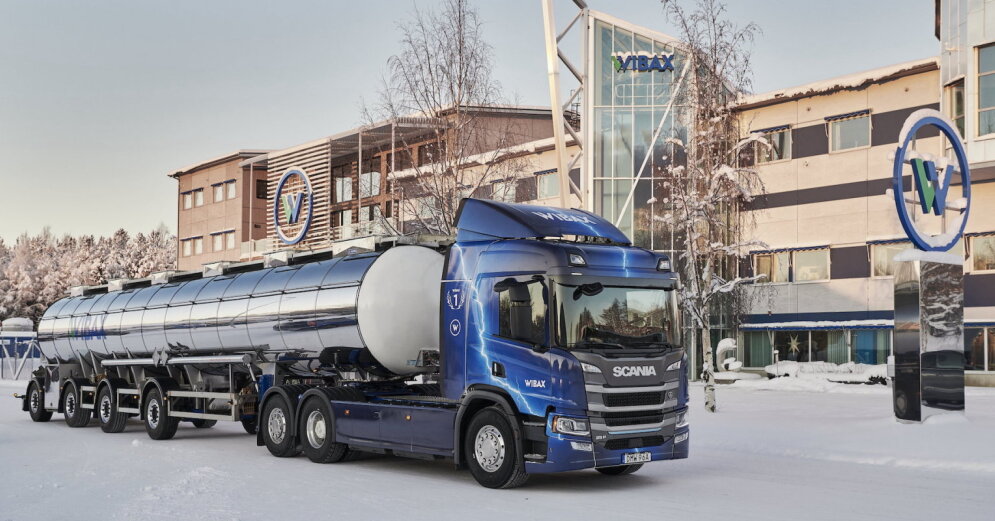The supply of electric vehicles and the possibilities to adapt it are growing rapidly. This claim is confirmed Sweden a company “Scania“, handing over 80 tonne of fully electric lorries and 64 tonnes of lorry chemicals for field testing.
–
–
Content will continue after the ad
Advertising
–
Significant technical advances in heavy-duty electric mobility have been achieved in close cooperation with customers who identified the need for such transport, Scania said.
Riga Technical University (RTU) Oskars Irbītis, a lecturer at the Department of Automotive Engineering at the Faculty of Mechanical Engineering, Transport and Aeronautics, explains that technically electric propulsion can handle such loads, and its application is somewhat natural, as electric motors have better torque characteristics than internal combustion engines.
“I think that in this case, the manufacturer primarily wants to show the wide range of possibilities and advantages of electric drivetrain.
To ensure smooth operation in difficult conditions, a truck can be equipped with reducers or reduced gears, but it will still be a much simpler transmission than if a gearbox with more than 10 gears is used, “explains the RTU lecturer.
A timber truck was developed together with the customer
There have been many technological leaps in Scania’s 130-year history. The greatest achievements have been made in trying to meet the special needs of customers. One such case is an electric timber truck with a maximum capacity of 80 tonnes, a sustainable vehicle developed in collaboration with Sweden’s largest wood, pulp and paper producer SCA (Svenska Cellulosa AB).
Electrification of road transport is crucial for Europe’s largest private forest owner and sawn timber producer to reduce the environmental impact of its operations. SCA transports approximately 8.5 million cubic meters of timber annually with 265 trucks. The company cooperates with 87 transport companies.
A Scania electric truck transports timber between the SCA terminal in Umeå and its paper mill in Obola.
“Working with Scania is important for us to work together to find innovative sustainable transport solutions. With just one electric truck on the route between the terminal and the paper mill, we can reduce our carbon footprint by around 55,000 kilograms a year,” says Hans, SCA’s Head of Sustainability Planning. Djurbergs.
The truck, developed in close collaboration with SCA and the Swedish Forest Research Institute (Skogforsk), is an important step in the transition to sustainable transport. The manufacturer, together with smart customers, has long been promoting the idea of sustainability.
“Electrification is the key to achieving zero emissions in the transport sector, and we will achieve this with customers and other stakeholders who support our values. The kind of collaboration we have with SCA, where we are demonstrating opportunities at an early stage, is a clear sign that “We need to change the pace so we can get rid of fossil fuels faster and meet the goals of the Paris Climate Agreement,” said Fredrik Allard, Scania’s head of e-mobility.
He also points out that, until very recently, timber transport was described as an industry that could never be electrified, but that recent years have shown how fast both vehicles and batteries are evolving.
According to RTU lecturer Irbītis, providing a huge energy reserve for high-power electric motors is a huge challenge. Vehicles have to move extremely heavy loads, have to overcome high air resistance, and the timber truck is likely to travel part of the distance on poor quality roads, which will further increase energy consumption.
“On the one hand, the truck’s large dimensions allow it to use a large battery. On the other hand, it can not only take up part of the potential cargo space, but also significantly increase the truck’s unladen weight. between the battery size and the optimal gross weight, “explains the technical nuances of the automotive engineer.
Also used in the chemical industry
The handover of Scania’s electric truck to chemical supplier Wibax, which uses it in the north of Sweden, is another achievement and an example of successful cooperation. The three-axle electric truck enables the customer to meet their climate goals, but close cooperation will allow the manufacturer to further improve its production.
The full weight of the vehicle – with trailer and load – can reach up to 64 tons. The car runs between the towns of Pete and Schellefteo in northern Sweden, covering 80 kilometers in one direction.
The car’s performance has been improved with a much more powerful electric motor. Load capacity has also been increased.
As part of a long-term partnership, Scania and Wibax will work together to optimize the use of trucks, including battery charging and life, as well as route planning. This will provide Wibax with valuable information as it prepares to expand its fleet in the future.
“Since the company was founded in 1986, we have done our best to be sustainable. We have concluded that freight transport has the greatest impact on the environment, so this electric truck is a major step towards mitigating climate change. During the life cycle of this truck,” Wibax “CO2 emissions will be reduced by up to 1,400 tonnes, which is a truly significant figure,” said John Wilkund, CEO of Wibax Group.
–


:format(jpeg)/cloudfront-us-east-1.images.arcpublishing.com/gfrmedia/AGPIKZT7INGQ5EZPELEBBHIWQY.JPG)